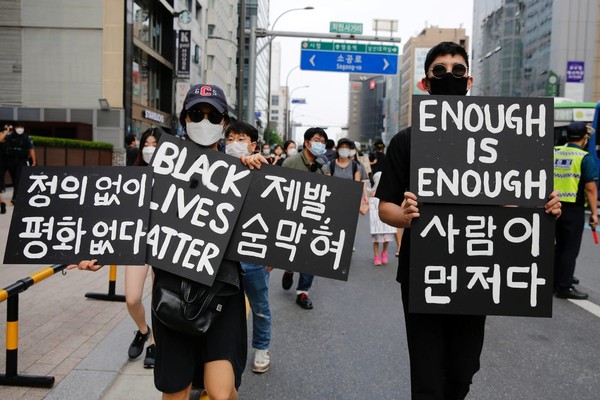Around the world, from Brazil to Israel, Sudan to Australia, BLM protests are underway. Sparked by the movement against police brutality, discrimination, and racism in the United States, demonstrations have gone global - demanding change not only in the US but also in every national context. These protests are no longer only about the murder of George Floyd, but the injustice and violence towards Black people and other ethnic minorities across nations.

In South Korea, the Black Lives Matter movement is also gaining momentum. On June 6, activists rallied in Seoul in solidarity with the protests in the US and in recognition of the prevalent racism in Korean society. Korean artists have been outspoken in their support of the movement as well, inspiring their fans to take action. Korea has always been ethnically homogeneous and resistant to foreign influences throughout history, and so the increasing issues and instances of discrimination based on race are rarely discussed or protested on this level. As the number of foreign residents rapidly increases, the risk of severe racist acts becoming normal is a real possibility here, unless the negative attitudes towards foreigners are recognized and addressed.
Many international students at KAIST have already experienced small acts of discrimination, in the form of racial stereotypes, denied opportunities, and exclusion from communities. Outside the university setting, xenophobia and racism are much more pronounced. 7 out of 10 foreign residents in Korea say that they have experienced racial discrimination, according to a survey by the National Human Rights Commission. From hearing insults and slurs like “dirty”, “smelly” or “dark-skinned”, being denied entrance to restaurants and bars based upon race, to being bullied in schools and workplaces, those who look different here are treated differently too. Foreigners can recognize the injustice in these situations; recognizing injustices abroad is equally important.
Each and every one of us has been complicit in or impacted by racism. It is a learned form of hate, so rampant that it has become ingrained and naturalized in societies over the centuries. But people are capable of unlearning racism. Unlearning racism does not mean learning to be “not racist”; it is more than taking the neutral stance to avoid confrontation or to follow the path of least resistance. Remaining silent is remaining complicit in the discrimination around you. The opposite of racism is anti-racism. Speak up against small and large examples of racism in your life; share resources that have helped you to learn. Fighting injustice through education, discussion, and action - being actively anti-racist - is relevant everywhere.

